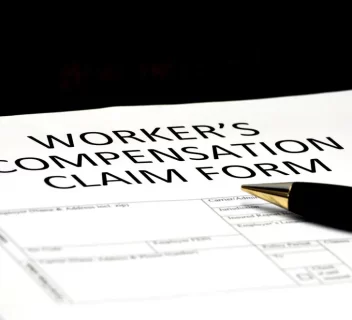Personal Injury vs Workers Comp: Understanding Key Differences
Not sure if your injury calls for a personal injury claim or workers comp? This quick guide will help you understand the main differences between personal injury vs workers comp, what you need to prove, and the types of compensation available for each.
Key Takeaways
- Personal injury claims require proving fault for negligence, while workers’ compensation operates on a no-fault basis, providing benefits to an injured employee regardless of fault.
- The range of recoverable damages in personal injury claims includes pain and suffering, lost wages, and both present and future medical expenses, whereas workers’ compensation covers only limited economic losses.
- In some cases, injured workers can file both personal injury and workers’ compensation claims to maximize compensation, particularly when third-party actions contribute to the injuries.
Key Differences Between Personal Injury vs Workers’ Comp Claims
The distinction between personal injury claims and workers’ compensation claims is primarily centered around the necessity to establish fault. For personal injury cases, it’s imperative that the victim prove their injuries were a direct result of someone else’s carelessness. This process can become quite involved as it requires collecting extensive evidence and navigating through intricate legal procedures. The workers compensation insurance carrier plays a crucial role in the claims process, reviewing claims and determining the benefits available to the injured worker.
Conversely, injured workers seeking benefits under the workers’ compensation framework benefit from its no-fault nature. They are not required to show that either their employer or a colleague was responsible for their injuries in order to be eligible for benefits. This aspect streamlines the application procedure considerably for those harmed on the job. The legal framework of worker’s compensation includes specific eligibility criteria and disability classes that dictate the benefits available to injured workers.
While pursuing a personal injury claim may afford more expansive recompense such as damages for pain and suffering, reparation through workers’ compensation is limited to specific economic losses only.
Proving Fault in Personal Injury Claims
Establishing liability is essential in personal injury cases. To secure compensation, the injured individual must demonstrate that their harm resulted from another’s carelessness through evidence such as eyewitness accounts, official incident documentation, and expert evaluations. For instance, in a vehicular mishap scenario, it may be crucial to show the other motorist’s negligence by providing proof of speeding or distraction. Establishing negligence is crucial in a personal injury case as it directly impacts the ability to obtain compensation for the injuries sustained.
Fault does not always need to be established for every personal injury claim. In instances like product liability suits where there is a focus on an item’s flawed condition rather than someone’s oversight. Similarly, if gross neglect by an employer or external entity caused workplace injuries, a valid personal injury suit could ensue without directly proving fault.
Personal injury litigation can grow complex with several potential liable parties involved. Take for example when an employee sustains injuries while operating a corporate car. Assessing culpability might require scrutinizing both the company’s diligence regarding vehicle upkeep and any additional implicated entities’ actions or omissions. Due to these complexities typically encountered within such legal matters involving multiple liability angles, securing skilled personal injury lawyers is critical for successfully steering through the intricacies of pursuing redress in a personal injury lawsuit.
No-Fault System in Workers’ Compensation
The workers’ compensation system is structured as a no-fault framework, which significantly changes the approach to filing claims. Employees who have suffered injuries are not required to show that their employer was responsible for the injury in order to obtain benefits. The intent behind this feature of the system is to expedite benefit distribution and minimize protracted legal disputes.
Under this no-fault arrangement, employees can secure benefits without having to establish culpability. This facilitates prompt access to financial aid that includes compensation for lost wages, coverage for medical expenses, and support with vocational rehabilitation services. This method stands in stark contrast to personal injury claims where it’s imperative to prove another party’s fault in order to succeed with a claim.
Types of Damages Recoverable
In personal injury claims, the scope of recoverable damages extends more than it does in workers’ compensation claims. Victims may receive compensation for various losses including medical expenses, lost wages, and even pain and suffering. Additionally, personal injury claims allow for the recovery of future medical expenses, providing a more comprehensive approach to compensation for injured individuals.
On the other hand, workers’ compensation is limited to covering particular financial losses like a portion of lost income and medical bills due to its no-fault framework as set by the worker’s compensation insurance carrier.
Damages in Personal Injury Claims
The scope of compensation available in personal injury claims encompasses a wide array of damages. Those affected are entitled to pursue financial redress for:
- the mental anguish and suffering experienced
- healthcare costs incurred
- earnings missed due to inability to work
- diminished quality or enjoyment of life
Such reparations serve to reinstate the injured individual’s prior state before the incident, addressing both their fiscal losses and psychological distress.
In scenarios involving personal injury, remuneration for lost income is usually dispensed upon the conclusion of the case rather than as ongoing support throughout recuperation. Future healthcare expenses and potential losses in earning ability are also factored into settlements, catering to long-term repercussions resulting from injuries sustained.
Multiple variables can influence the total amount awarded in personal injury cases. Critical considerations include how severe an individual’s injuries are, clear indications pointing toward negligence on behalf of another party, along with the responsible entity’s insurance policy limits or overall asset value. The overarching goal remains consistent – ensuring fair restitution is obtained by those harmed through no fault of their own.
Benefits in Workers Compensation Claims
Workers’ compensation offers a narrower scope of benefits compared to those available in personal injury claims. It covers costs such as medical expenses, wage replacement, and vocational rehabilitation for employees injured on the job. Under workers’ compensation law, around 60% of an employee’s lost wages are typically compensated after an initial three-day period following the injury.
It is important to note that workers’ compensation falls short when it comes to certain types of recovery offered by personal injury claims. Specifically, it does not provide remuneration for non-economic damages like pain and suffering but rather concentrates on economic losses and providing support for recovery and return to work.
Filing Both Claims
In specific situations, workers who have sustained injuries might be entitled to pursue a dual course of action by filing both a personal injury claim and a workers’ compensation claim. If a third party is involved, they may also have the option to file a separate personal injury lawsuit. Taking this combined approach can be crucial in ensuring they receive the fullest possible compensation, particularly if the harm incurred was due to either an external party’s involvement or extreme negligence on their employer’s part.
When Can You File Both?
When the actions of a third party contribute to an injury at work, it’s feasible for the injured worker to pursue both a workers’ compensation claim and a separate personal injury claim. Take an instance where defective equipment causes harm to an employee. They can seek immediate benefits through a workers’ compensation claim while also filing a personal injury lawsuit against the manufacturer of that equipment.
In situations where an employer is found to have acted with gross negligence, pursuing both types of claims might be warranted. Filing for workers’ compensation alongside asserting a personal injury claim could provide the injured worker with more complete financial restitution for their losses.
Legal Guidance for Dual Claims
Handling the challenges of simultaneous claims demands the skill set of a seasoned attorney. It’s essential to have legal counsel adept at dealing with the nuances involved in both workers’ compensation and personal injury claims to make certain that an injured worker secures the highest possible compensation.
A lawyer with significant experience can offer support through appeals, mediation, and conflict resolution—steps frequently necessary in workers’ compensation cases. The proficiency of such a professional guarantees that an injured worker’s rights are upheld during every stage of the claiming process.
Statute of Limitations for Each Claim
It is imperative to comprehend the statute of limitations as it plays a crucial role in filing workers’ compensation and personal injury claims within established deadlines. Failure to meet these time constraints can significantly hinder one’s ability to secure restitution, underscoring the importance of knowing the precise timelines for such claims.
Time Limits for Personal Injury Claims
In the state of New York, the statute of limitations for personal injury claims is typically set at three years. This countdown begins on the date that the personal injury took place. It affords a period during which evidence can be collected, and consultations with legal professionals can occur before proceeding to file a claim by the injured party.
It’s imperative to adhere to this deadline because if a claim is not filed within these three years, it may lead to dismissal and thus eliminate any possibility of financial recovery for damages incurred. Prompt action in filing is essential for those seeking compensation due to personal injuries.
Time Limits for Workers Compensation Claims
In New York, individuals have a two-year statute of limitations for filing workers’ compensation claims starting from the injury date. It’s essential to act swiftly within this limited period to secure eligibility for benefits.
It is mandatory for employees to inform their employer about the injury within a 30-day window if they wish to preserve their ability to submit a workers’ compensation claim. This notification plays an integral role in the procedure of claiming workers’ compensation.
Important Considerations for Injured Workers

There are several crucial factors that injured employees must keep in mind when pursuing their claims. One of the most critical is adhering to claim filing deadlines, as failing to do so could risk losing the chance for compensation.
How the injury affects an individual’s job status and immigration situation, along with how well they coordinate with healthcare providers, significantly affects the progression and resolution of their claims.
Impact on Employment Status
Submitting a claim for workers’ compensation is designed not to jeopardize an injured employee’s job. Employees are shielded by federal and state regulations from any retaliatory measures taken by employers when they initiate workers’ compensation claims. This legal safeguard allows employees who have suffered injuries on the job to pursue their rightful benefits with confidence, secure in the knowledge that such actions should not lead to termination of employment.
There is an emphasis on keeping these matters private. Employers must uphold the privacy of workers’ compensation claims, which serves as a barrier against discrimination or negative repercussions towards the individual who sustained injuries while at work.
Immigration Status
Many undocumented workers are hesitant to submit claims due to concerns about potential deportation or legal issues. Nevertheless, several states, New York included, permit these workers to apply for workers’ compensation and do so without facing the danger of being deported. This provision guarantees that every worker has the opportunity to obtain required benefits following an injury, regardless of their immigration status.
It is crucial to uphold the rights of all employees and make sure they can secure essential medical care along with monetary assistance without fear from immigration authorities.
Coordination with Medical Providers
It is imperative that medical care be sought immediately after sustaining a work-related injury. Prompt attention from healthcare providers not only facilitates appropriate treatment but also ensures that the injuries are well documented, which is crucial for securing workers’ compensation benefits. It’s equally important to report the incident to one’s employer or relevant authorities in a timely manner to preserve eligibility for these benefits.
Clear and ongoing communication with medical professionals plays an essential role in accurately documenting work-related injuries. Such meticulous documentation becomes instrumental when navigating both workers’ compensation and personal injury claims, as it substantiates the severity and consequences of the injuries with solid medical evidence.
The Role of Personal Injury vs Workers’ Comp Lawyers
Personal injury attorneys and workers’ compensation lawyers play a vital role in guiding through the intricacies of injury claims. They offer the necessary legal knowledge to help injured workers obtain just compensation and guarantee that they acquire the benefits they deserve.
Contact 1-800-THE-LAW2 today for a free consultation with a personal injury or workers’ compensation attorney in our professional network.
How Personal Injury Attorneys Help
Attorneys specializing in personal injury concentrate on securing the highest possible compensation for those who have been harmed. Their expertise covers a variety of incidents such as vehicular collisions, construction site accidents, instances of medical negligence, and falls due to slips. They are dedicated to making sure that their clients obtain rightful recompense through personal injury lawsuits.
Such legal professionals adeptly traverse the intricate realm of personal injury law by amassing proof, engaging in discussions with insurers, and advocating for their clients before the courts when needed. Their primary objective is to guarantee comprehensive remuneration for individuals they represent covering areas like mental anguish, earnings lost from work incapacity, and health-related expenditures incurred due to injuries.
How Workers Compensation Lawyers Assist
Attorneys specializing in workers’ compensation are crucial in guaranteeing that injured employees obtain the benefits rightfully theirs. They manage disagreements with insurers, challenge claims rejections, and see to the swift advancement of cases. Their knowledge is critical for defending the rights of those who have sustained workplace injuries and for acquiring requisite compensation.
These legal experts aid with mediation and dispute resolution processes frequently needed within workers’ compensation claims. Their participation can greatly alter the trajectory of a case, offering essential backing to injured laborers as they maneuver through the intricacies of this system.
Summary
Grasping the essential distinctions between personal injury claims and workers’ compensation claims is critical for those who have been injured on the job. One must demonstrate liability in personal injury cases, which may result in a wider array of reparations, encompassing recompense for pain and suffering. Conversely, workers’ compensation is designed to function without assigning blame, providing restricted economic assistance. Comprehending how to properly initiate either kind of claim can be instrumental in achieving maximum remuneration and facilitating thorough recuperation.
It’s imperative that injured employees observe all filing deadlines closely while being aware of their entitlements—immigration status notwithstanding—and collaborate with healthcare professionals to meticulously document their injuries. Attorneys specializing in personal injury or workers’ compensation are vital allies in this process. They help navigate through the intricacies ensuring rightful benefits and indemnities are granted. With these insights at hand, individuals affected by workplace injuries can assertively undertake appropriate actions toward upholding their rights and making a complete recovery from their setbacks.
Frequently Asked Questions
The main difference between personal injury claims and workers’ compensation claims is that personal injury claims necessitate demonstrating fault or negligence on the part of another party, whereas workers’ compensation claims are based on a no-fault system that does not require such proof.
Yes, you can file both a workers’ compensation claim and a personal injury claim for the same injury — but ONLY if a third party is involved or if there is gross negligence by your employer. Generally speaking, workers’ compensation bars a lawsuit against your own employer for the same injury.
That being said, pursuing both claims can potentially increase your overall compensation.
In a personal injury claim, you can recover various types of damages, including medical expenses, lost wages, emotional pain and suffering, and compensation for future medical needs or permanent impairment. Personal injury claims also allow for the recovery of future medical expenses, providing a more comprehensive approach to compensation.
This comprehensive approach ensures that all aspects of your suffering are taken into account.
Workers’ compensation offers significant benefits, including wage replacement, medical expenses coverage, and vocational rehabilitation. Typically, it covers around 60% of lost wages and provides permanent impairment benefits for lasting disabilities.
In the state of New York, an individual has a three-year window starting from the date of sustaining an injury to file a personal injury claim. Conversely, for workers’ compensation claims, there is typically a two-year filing period from the date of the injury. One must inform their employer about the incident within 30 days.
It’s essential to observe these time constraints in order to preserve your eligibility to seek financial recompense.




